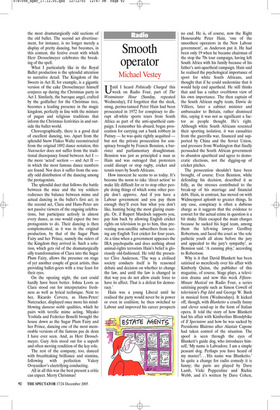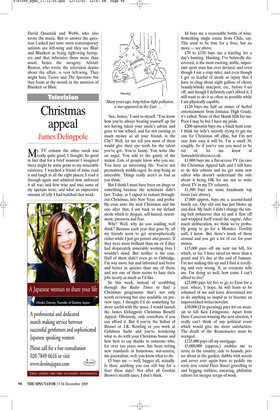Smooth operator
Michael Vestey
Until I heard Politically Charged this week on Radio Four, part of The Westminster Hour (Sunday, repeated Wednesday), I’d forgotten that the sleek, smug, perma-tanned Peter Hain had been prosecuted in 1972 for conspiracy to disrupt all-white sports tours from South Africa as part of the anti-apartheid campaign. I remember his absurd, bogus prosecution for carrying out a bank robbery in Putney — he was quite rightly acquitted but not the private prosecution for conspiracy brought by Francis Bennion, a barrister and parliamentary draughtsman. Bennion was just as principled a man as Hain and was outraged that protesters could disrupt or stop rugby, cricket and tennis tours by South Africans.
How innocent he seems to us today. It’s become the norm to take ‘direct action’ to make life difficult for or to stop other people doing things of which some other people don’t approve. And if you have a Labour government and you pay them enough they’ll even ban what you don’t like, hunting being the most glaring example. Or, if Rupert Murdoch supports you, pay him back by allowing English cricket rights on television to go to him, thus preventing non-satellite subscribers from seeing any English Test cricket for four years. At a time when a government appeases the IRA psychopaths and does nothing about animal-rights terrorists Hain’s belief is gloriously old-fashioned. He told the presenter Clive Anderson, ‘The way a civilised society conducts itself is by reasoned debate and decision on whether to change the law, and until the law is changed in that way you do not allow crude force to have its affect. That is a defeat for democracy.’ Hain was a young Liberal until he realised the party would never be in power or even in coalition; he then switched to Labour and improved his career prospects no end. He is, of course, now the Right Honourable Peter Hain, ‘one of the smoothest operators in the New Labour government’, as Anderson put it. He had been only 19 when he became chairman of the stop the 70s tour campaign, having left South Africa with his family because of his father’s anti-apartheid campaign. Hain said he realised the psychological importance of sport for white South Africans, and thought that if he could undermine that it would help end apartheid. He still thinks that and has a rather overblown view of his own importance. The then captain of the South African rugby team, Dawie de Villiers, later a cabinet minister and ambassador to Britain, rather dismissed this, saying it was not as significant a factor as people thought. He’s right. Although white South Africans resented their sporting isolation, it was casualties from the guerrilla war, financed and supported by China and the Soviet Union, and pressure from Washington that finally persuaded the South African government to abandon apartheid and agree to democratic elections, not the digging-up of cricket pitches.
The prosecution shouldn’t have been brought, of course. Even Bennion, while defending his decision, described it as folly, as the stresses contributed to the break-up of his marriage and financial debt. Hain, in contrast, has moved on with Widmerpool aplomb to greater things. In any case, conspiracy is often a dubious charge as it suggests that the evidence to convict for the actual crime in question is a bit shaky. Hain escaped the main charges because he sacked his legal team, among them the left-wing lawyer Geoffrey Robertson, and faced the court as ‘the sole pathetic youth all alone before the jury and appealed to the jury’s sympathy’, as Bennion said. ‘A cunning ploy,’ according to Robertson.
Why is it that David Blunkett has been satirised so mercilessly over his affair with Kimberly Quinn, the publisher of this magazine, of course. Stage plays, a television drama and now this week FifteenMinute Musical on Radio Four, a series satirising people such as Simon Cowell of television’s Pop Idol and George W. Bush in musical form (Wednesdays). It kicked off, though, with Blunketto a cruelly funny and clever send-up in the form of Italian opera. It told the story of how Blunkett had his affair with Kimberlino Blondybike of Il Spectatore and how he was sacked by Presidente Blairmo after Alastair Capone had taken control of the situation. The spoof is seen through the eyes of Blunkett’s guide dog, who introduces himself, ‘My name is Labradore. I am a simple peasant dog. Perhaps you have heard of my master?... His name was Blunketto.’ In quite a change for radio comedy it is funny; the parts are played by Dave Lamb, Vicki Pepperdine and Richie Webb, and it’s written by Dave Cohen, David Quantick and Webb, who also wrote the music. But to answer the question I asked just now: most contemporary satirists are left-wing and they see Blair and Blunkett as being right-wing betrayers and that infuriates them more than usual, hence the savagery. Alistair Beaton, who wrote the television drama about the affair, is very left-wing. They might hate Tories and The Spectator but they foam at the mouth at the mention of Blunkett or Blair.



















































































 Previous page
Previous page